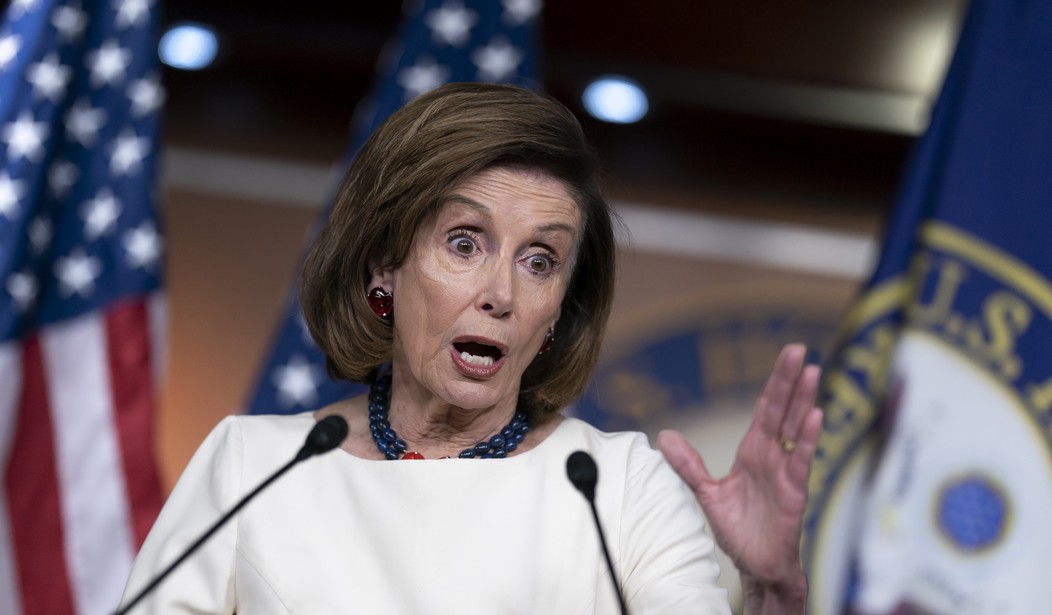Archbishop Salvatore Cordileone may ask himself the same question — but probably won’t, because there’s not much of a question to ask. Just weeks after announcing an edict that barred Nancy Pelosi from receiving the Eucharist at Mass. Today, the Vatican offered Pelosi communion within the Holy See, contradicting one of its own bishops.
What does that mean? Well… not anywhere near as much as it seems:
House Speaker Nancy Pelosi received communion while attending mass at the Vatican in Rome, despite the fact the archbishop in San Francisco said she would be denied the sacrament because of her views on abortion.
Ms Pelosi, who is a devout Catholic, received the sacrament at a mass spoken by Pope Francis at St Peter’s Basillica on Wednesday. The mass was done for the feast of St Peter and St Paul.
The Pope does not give communion during such ceremonies and anyone who wishes to take communion simply has to approach one of the priests at the basillica. [sic]
Exactly. Recall what Cordileone actually wrote in his edict. He didn’t order priests to deny Pelosi the Eucharist, at least not explicitly. He did write that she was “not to be admitted to Holy Communion,” but never explained how that would work. The old model of small neighborhood churches where priests exclusively distribute the Eucharist and know everyone at the altar rail are long gone. In most Catholic churches, which now tend to be larger and serve a wider community, lay people distribute communion along with the priests, with no authority to deny it to anyone who presents themselves. The edict was meant as a directive to Pelosi, to instruct her not to present herself for communion, especially in churches under Cordileone’s authority.
The Vatican doesn’t have a requirement to abide by that, but they also don’t have a mechanism to do so even if the Holy See desired it. They have more than enough priests to distribute the Eucharist at Masses, but they also have no idea who’s prepared to receive and who isn’t. Almost certainly, none of the priests at the Vatican would have recognized Pelosi anyway.
The upshot of all this is that this isn’t likely to be a reflection of the Vatican’s view of the edict from Cordileone. In fact, as Inés San Martin reminds us at Crux, Pope Francis himself at least gave Cordileone some indirect moral support on that point, albeit a year earlier:
Pope Francis referred to the question of pro-abortion politicians and Communion in 2021, on his return to Rome from Slovakia.
At the time, Francis said that the Eucharist is for those who are “in the community” and politicians who support abortion are “outside of the community.”
However, he also said that in these cases, it’s a pastoral matter that must be addressed by the individual’s pastor.
Pope Francis began his response by saying that he’s never denied Communion to anyone, but also that, “I don’t know if any came in this condition. But I was never conscious of having in front of me a person like the one you describe.”
In other words, the story here isn’t “Vatican Contradicts Bishop over Abortion and Communion.” The story here is “Catholic Woman Defies Her Bishop on Other Side of the World.” Even the normally progressive-friendly National Catholic Reporter didn’t bother to comment on Pelosi’s communion, at least as of midday when I was writing this post. That’s because it may be news, but it’s not really much of a story … except in how it relates to Pelosi’s orientation to the church and her recognition of the authority of her bishop. And that hasn’t changed at all, so even as news it’s not much.








Join the conversation as a VIP Member